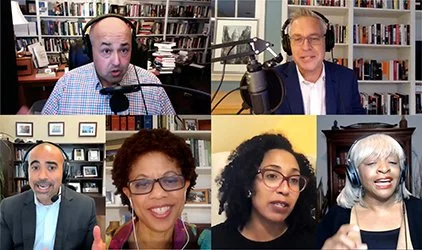Aftermath 2020
The year 2020 has been eventful, to say the least. What might 2021 have in store?
Read
It’s been a long year: A tiny virus laid us low, protests over racial injustice erupted across the country, climate change loosed record-setting wildfires and hurricanes, and citizens voted in one of the most fraught national elections ever. So what did 2020 reveal about the state of democracy in America and across the world — and what will come in its wake? In this live recording for our season finale, a panel of experts helps Will and Siva break it all down and build it back up.
Historians Carol Anderson and Leah Wright Rigueur, along with policy whizzes Melody Barnes and Ian Solomon, put their heads together to ask, “Where do we go from here?”
Meet
Carol Anderson is the Charles Howard Candler Professor of African American Studies at Emory University and author of White Rage: The Unspoken Truth of Our Nation's Divide, a New York Times Bestseller. She is also the author of Eyes Off the Prize: The United Nations and the African American Struggle for Human Rights, 1944-1955; Bourgeois Radicals: The NAACP and the Struggle for Colonial Liberation, 1941-1960, and One Person, No Vote: How Voter Suppression is Destroying Our Democracy, a finalist for the PEN/Galbraith Award in non-fiction.
Melody Barnes is co-director of policy and public affairs for the UVA Democracy Initiative. She is also the Dorothy Danforth Compton Professor of Practice at the university’s Miller Center of Public Affairs, and a distinguished fellow at the law school. Barnes was director of the White House Domestic Policy Council under President Obama, and assistant to the president. She has also worked at the Center for American Progress and as chief counsel to the late Sen. Edward Kennedy on the Senate Judiciary Committee.
Leah Wright Rigueur is the Harry Truman Professor of American History at Brandeis University and the author of The Loneliness of the Black Republican: Pragmatic Politics and the Pursuit of Power. An expert on 20th century African American history, civil rights and political ideology, Rigueur has contributed news analysis to ABC, CNN, MSNBC, NPR and other media organizations. She is working on a new book about the Housing and Urban Development scandal under the Reagan administration in the 1980s.
Ian H. Solomon is dean of UVA’s Frank Batten School of Leadership and Public Policy and a professor of practice. Previously, Solomon founded and ran Solomon Global LLC, an advisory firm specializing in negotiation, collaboration and conflict management. He also worked as vice president for global engagement at the University of Chicago, as U.S. executive director for the World Bank Group, as senior advisor to U.S. Treasury Secretary Timothy Geithner, and as legislative counsel to Barack Obama when Obama was a U.S. senator representing Illinois.
Read about Solomon’s vision of leadership, in UVAToday.
Together with historian Andrew Kahrl, Barnes considers the threat that the coronavirus pandemic poses to democracy — and what universities might do about it. Institutions of higher learning cannot be “ivory towers on a hill,” the authors argue.
Check out this interview with Rigueur at the Harvard Kennedy School and find out why she says “Democracy is Not a Given.”
Anderson saw her home state of Georgia deliver the electoral shock of the year, flipping the Peach State from red to blue. In this post-election analysis for The Guardian, she writes that Georgians — and U.S. citizens across the nation — rose up to defend themselves against voter suppression.
Don’t miss our previous episodes with Anderson and Rigueur: “Voting Blocked” and “Broken Promises.”
Learn
Two runoffs in Georgia will decide control of the U.S. Senate. Can the Democrats swing the state further left? Elena Schneider ponders that question for Politico.
Donald Trump hasn’t made any signs of conceding. That can’t effect whether Joe Biden becomes president on Jan. 20, but Damon Linker recently argued in The Week that Trump’s final intransigence will nevertheless hurt the country: “not necessarily in the coming days and weeks,” he writes, “but in the presidential elections and transitions of the future.”
Attorney General Bill Barr has invited federal prosecutors to pursue President Trump’s baseless claims of voter fraud. Find out why one of them resigned.
The Guardian’s Bhaskar Sunkara isn’t worried about Donald Trump anymore. He’s worried about who might take up Trump’s authoritarian mantle in the future.
In case you missed it, you might want to read this in-depth story from The New York Times — about Vice President-elect Kamala Harris’s upbringing. An avowed pragmatist, she was raised among radical intellectuals in Berkeley, Calif.
With a divided Congress and a conservative Supreme Court, what can Biden do to begin dismantling the Trump legacy? The Washington Post outlines his most likely moves once he takes office.
And — if you listened to the show — you might have picked up on a compelling reference from our listener Shannon Rozner of the Chautauqua Institution. She cited a book by Eddie S. Glaude Jr., Begin Again: James Baldwin’s America and Its Urgent Lessons for Our Own, which sheds an important historical light on the ongoing struggle for real freedom and democracy. In it, Glaude explores the trauma and the promise of the United States through the life of one of the greatest writer-activists of the 20th century.


